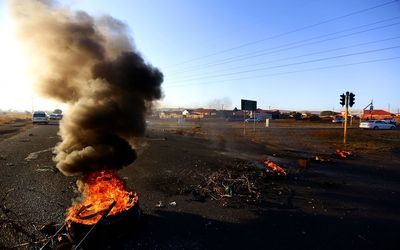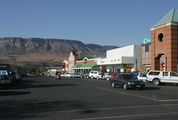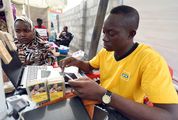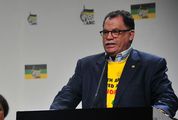THE thing about the violent protests in Tshwane is that they are not completely about Tshwane. But even more important is the fact that none of our pet theories and explanations will help us reach a full understanding of the reasons for the people of Tshwane reacting violently to the appointment of Thoko Didiza as the mayoral candidate of the ANC for the local government elections. So, I will not try to explain.
For now, let’s visit the (dis)United Kingdom. I can’t say I was surprised by the decision of the majority of British citizens to vote for the UK’s exit from the European Union, notwithstanding the scaremongering they were subjected to by representatives and apologists of the establishment.
Nor will I be surprised in August if voters defy our predictions about the performance of the ANC in the local government elections. I am, of course, referring to our predictions as pundits, talkshow hosts, mainstream media, social media and coffee shop revolutionaries, the thinking and chattering class and, of course, those who say the ruling party has "disappointed" them, when voting for the ANC has never been part of their political DNA.
Globally, "ordinary people" are gatvol with the establishment. They are gatvol with the iniquitous manner in which the establishment, aided quite ably by its offspring — the economic and political elites — accumulate wealth. Ordinary people are angry about how the elites use their power in ways that have compromised the democratic experience of citizens and as a result of which, in many "democratic" countries, democracy has been reduced to a narrow electoralism that has turned elections into a mere ritual.
While there is no doubt that prejudice played some part in the Brexit vote, I have no doubt either that the iniquitous distribution of wealth in the global and national spheres informs part of the growing antipathy towards political elites who, in too many cases, are the stormtroopers of wealthy classes.
In fact, the reason pundits and their polls got the referendum wrong is because they are largely not independent. They are created in the image of the establishment and were created from its ribs. They worship at the feet of the establishment and see the world through its eyes. They have become so desensitised to its power that they think its interests are synonymous with theirs, especially in cases where the establishment has the decency to throw crumbs in their direction.
As a consequence, we are out of touch because we have reduced our roles to that of court jesters to the wealthy.
This is why there is a possibility that our doomsday scenarios for the ANC in the August election may not eventuate. We must be open to the possibility that, because we are out of touch, the ANC will suffer erosions in electoral support but nothing as drastic as our predictions.
On the other hand, maybe I am the one who is out of touch. Out of touch or not, the anti-establishment impulse of South African voters is both similar and dissimilar to the impulses of British voters.
Many a South African citizen including many an ANC voter, is gatvol with the governing party. It has become a powerful metaphor for all things corrupt and venal in postapartheid SA. Some of its leaders are becoming increasingly hostile towards democratic values.
The party and its alliance partners have become a multiheaded snake whose heads have started to devour the body from the tail. As a result, those who were not for democracy before 1994 are now convinced this snake has already devoured the sins of apartheid. This is why they are so shameless in their arrogance.
This arrogance is, in part, the reason why some opposition parties will struggle to win sufficient support from black voters who are very angry with the ANC.
It is for this reason that ANC voters in Tshwane may choose to stay at home instead of voting for the DA. A low voter turnout in Tshwane may favour opposition parties, but will that be enough to help them wrest Tshwane from the ANC?
But, the ANC must take cold comfort from my scepticism. It may well be that it will be undermined by the low turnout of its supporters in Tshwane and elsewhere in the country. Alternatively, ANC votes may go to the EFF as an alternative to the DA.
Where will the broken hearts of ANC voters go?
• Matshiqi is an independent political analyst

Residents of Atteridgeville west of Pretoria protesting against mayoral candidate Thoko Didiza for the upcoming local government elections to be held in August 2016. Picture: SIZWE NDINGANE/THE TIMES
THE thing about the violent protests in Tshwane is that they are not completely about Tshwane. But even more important is the fact that none of our pet theories and explanations will help us reach a full understanding of the reasons for the people of Tshwane reacting violently to the appointment of Thoko Didiza as the mayoral candidate of the ANC for the local government elections. So, I will not try to explain.
For now, let’s visit the (dis)United Kingdom. I can’t say I was surprised by the decision of the majority of British citizens to vote for the UK’s exit from the European Union, notwithstanding the scaremongering they were subjected to by representatives and apologists of the establishment.
Nor will I be surprised in August if voters defy our predictions about the performance of the ANC in the local government elections. I am, of course, referring to our predictions as pundits, talkshow hosts, mainstream media, social media and coffee shop revolutionaries, the thinking and chattering class and, of course, those who say the ruling party has "disappointed" them, when voting for the ANC has never been part of their political DNA.
Globally, "ordinary people" are gatvol with the establishment. They are gatvol with the iniquitous manner in which the establishment, aided quite ably by its offspring — the economic and political elites — accumulate wealth. Ordinary people are angry about how the elites use their power in ways that have compromised the democratic experience of citizens and as a result of which, in many "democratic" countries, democracy has been reduced to a narrow electoralism that has turned elections into a mere ritual.
While there is no doubt that prejudice played some part in the Brexit vote, I have no doubt either that the iniquitous distribution of wealth in the global and national spheres informs part of the growing antipathy towards political elites who, in too many cases, are the stormtroopers of wealthy classes.
In fact, the reason pundits and their polls got the referendum wrong is because they are largely not independent. They are created in the image of the establishment and were created from its ribs. They worship at the feet of the establishment and see the world through its eyes. They have become so desensitised to its power that they think its interests are synonymous with theirs, especially in cases where the establishment has the decency to throw crumbs in their direction.
As a consequence, we are out of touch because we have reduced our roles to that of court jesters to the wealthy.
This is why there is a possibility that our doomsday scenarios for the ANC in the August election may not eventuate. We must be open to the possibility that, because we are out of touch, the ANC will suffer erosions in electoral support but nothing as drastic as our predictions.
On the other hand, maybe I am the one who is out of touch. Out of touch or not, the anti-establishment impulse of South African voters is both similar and dissimilar to the impulses of British voters.
Many a South African citizen including many an ANC voter, is gatvol with the governing party. It has become a powerful metaphor for all things corrupt and venal in postapartheid SA. Some of its leaders are becoming increasingly hostile towards democratic values.
The party and its alliance partners have become a multiheaded snake whose heads have started to devour the body from the tail. As a result, those who were not for democracy before 1994 are now convinced this snake has already devoured the sins of apartheid. This is why they are so shameless in their arrogance.
This arrogance is, in part, the reason why some opposition parties will struggle to win sufficient support from black voters who are very angry with the ANC.
It is for this reason that ANC voters in Tshwane may choose to stay at home instead of voting for the DA. A low voter turnout in Tshwane may favour opposition parties, but will that be enough to help them wrest Tshwane from the ANC?
But, the ANC must take cold comfort from my scepticism. It may well be that it will be undermined by the low turnout of its supporters in Tshwane and elsewhere in the country. Alternatively, ANC votes may go to the EFF as an alternative to the DA.
Where will the broken hearts of ANC voters go?
• Matshiqi is an independent political analyst



















